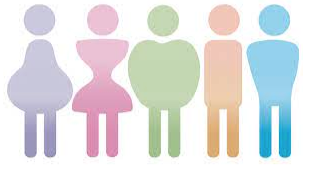Written by: Kate Di Guglielmo, Editor
CRUSHING: The world’s unrealistic expectations are ruining the mental state of present and future generations.
Food is meant to be enjoyed by everyone; however, it appears like food isn’t being enjoyed by anyone anymore. Why is that? Food is quickly losing its position as an expression of love and pleasure and turning into more of a burden. Girls and boys all over the world are suffering under painstaking body standards that provide an unrealistic image of what their bodies should look like. This leads to young children dieting, over-exercising, and putting unnecessary stress on their bodies so they can fit the standards of their favorite barbie doll.
According to the National Association of Anorexia Nervosa and Associated Disorders, (ANAD), a leading non-profit eating disorder support organization, ¨at least 10% of the population is struggling with an eating disorder, disordered eating, and or body image.” These societal standards are crushing the youth, and perpetuating the toxic idea that every girl has to be five feet, five inches, one hundred pounds, and with perfect skin. And that every boy has to be six feet, muscular, and ¨manly¨. Standards and societal rules are corrupting the youth of the world.
Even apps designed and marketed towards teenagers, (many of which hide behind the unenforced 13+ age restriction) such as the infamous TikTok advertise weight loss and restricted eating, which inevitably ends up in front of both teenagers and children.
(Screenshots of an advertisement on Tik Tok promoting restrictive eating)
Out of all places to advertise food restrictions, why do it on an app whose main consumer base is teenagers and children? Even if this app is “meant” for older children and young adults, it is well known that kids younger than the age limit are consistently on the app consuming community videos AND video advertisements. Advertisements promoting things like weight loss do not belong on an app where the known audience is still in their impressionable growing stages, and particularly susceptible to developing eating disorders and body image issues. This could lead to children who still have their ¨baby fat¨ to believe restricting their calories to 1500 calories per day will instantly make them look like the people being promoted. A calorie deficit at such a young age could lead to developmental issues, harmful eating habits, and even a chance of developing an eating disorder.
Also displaying inaccurate examples of what one should look like, are modeling companies that only accept models that are tall, skinny, and eat little to nothing. This gives off the impression to those who are aspiring models, or who choose to admire the girls and women who are represented everywhere, to believe that in order to be beautiful, you have to be thin. This once again can cause eating issues and an unhealthy mindset for young and impressionable children. Not only are these biases unhealthy for the consumer, but also the models themselves. Plenty of models across the world are told to lose weight to fit clothing made for the size of a child, ¨sample clothing¨. This leads to an increased prevalence of people developing¨eating disorders as well as [using] drugs to control weight,¨ Libby Lyons, a Licensed Clinical Social Worker and Certified Eating Disorder Specialist states. Thin is taught to be right, so people tend to chase it any way they can.
Although it is prevalent among beauty and fashion based companies to promote the idea that only skinny is beautiful, some businesses are attempting to break these stereotypes. Jolyn, a popular training suit company for swimmers, water polo players, beach volleyball players, and so many more, preaches that a beautiful body is a healthy body.
Two of many examples of Jolyn´s Instagram account displaying body positivity.)
Companies that promote healthy living and natural bodies are working to slowly reverse the societal standards of what one should look like.
Although we cannot change the unattainable beauty standards of the entire world, we can work one step at a time to change what we’re promoting to our youth. Instead of teaching children that not eating makes you beautiful, like many modeling companies do, let’s teach them that eating is beautiful. Why haven’t we broken the stereotypical Barbie and Ken body images, and replaced them with healthy and natural body types? Everyone is born with a different body. Society needs to teach us how to love the unique and beautiful body we have, every last inch and pound. The world now is full of more opportunities than ever before. Let’s not cripple the upcoming generations with unrealistic body standards before they even stand a chance. Healthy is beautiful. You are beautiful.

